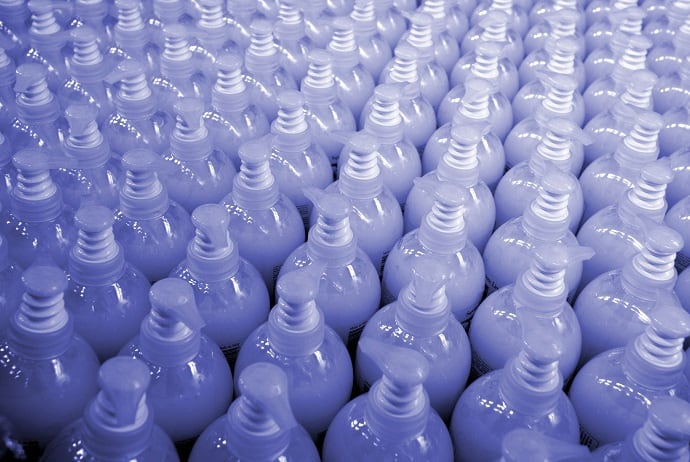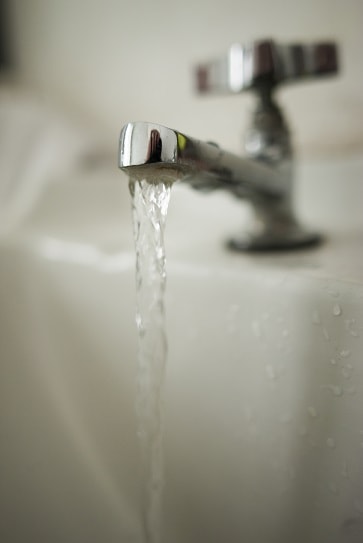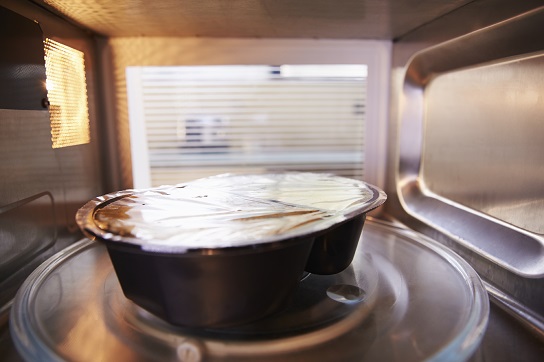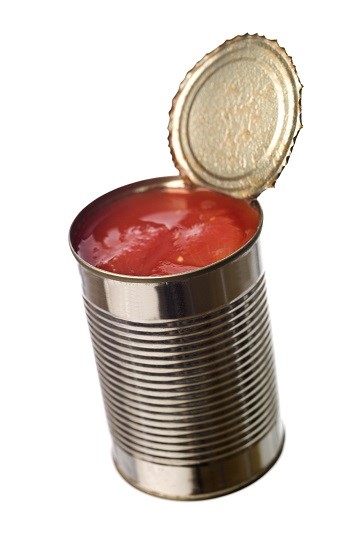 If you have read any health websites, acne forums, magazines or read any newspapers whatsoever then you’ll almost certainly be aware of the nightmare that is BPA.
If you have read any health websites, acne forums, magazines or read any newspapers whatsoever then you’ll almost certainly be aware of the nightmare that is BPA.
If not, then BPA is a chemical that is widely used in plastic products. It was first discovered all the way back in 1891, by a Russian chemist named Alexander Dianin. It was found to be extremely useful for hardening plastics, and numerous other functions and since then it has invaded a vast amount of commercial products…
BPA can be found in car wheels, newspapers, and paper receipts. It lurks in many household items like telephones, laptops, printers, and endless others. Finally, BPA has even invaded our food supply; food cans are lined with epoxy resin, which BPA is the main ingredient of.
BPA is an extremely common chemical in a variety of products, and for that reason scientists and their studies have been particularly interested in it. The results have not been good; they have found that BPA is pretty deadly indeed. This chemical which industry has relied on for so many years has now been exposed as a health destroying nightmare.
BPA has been implicated in causing brain retardation, it messes with your hormones, and there’s even evidence that it can give you cancer. People are now terrified of BPA and for good reason; it’s in a vast amount of products. The evidence against it is strong, and banning BPA is now being furiously debated in both the media and public health bodies.
With BPA being such a monstrous substance, I’m sure you’ve already thought of the inevitable question. So read on, and find out whether BPA can give you acne too…
Does BPA make acne worse?
 First let’s start with the basics of BPA. It can either enter your body orally or it can be absorbed through the skin, and both instances happen commonly.
First let’s start with the basics of BPA. It can either enter your body orally or it can be absorbed through the skin, and both instances happen commonly.
The BPA from food cans leaches into your food and then you eat it, and your skin can easily absorb the large amounts of BPA from paper receipts. Studies have confirmed that simply by touching BPA, your blood content can increase by a factor of five.
The point to remember is that it is very easy for BPA to enter your body. Once there it will give you acne and the main way it does so is extremely simple; by cranking up your chronic inflammation levels.
Because BPA is a toxic and harmful substance, your body will treat it to an immune response just like any other threat you ingest. Its response will be an increase in pro acne inflammatory chemicals, and if you constantly ingest BPA from numerous sources (which most people do), then the result will be an increase in chronic inflammation.
Read Annihilate Your Acne – get the diet that could transform your skin!
Inflammation is one of the two biggest factors behind the formation of acne, with the other being sebum oxidation. With no chronic inflammation your acne does not become red and massively swollen. Chronic inflammation can also contribute to a variety of other problems including acne nutrient depletion, and can actually cause sebum oxidation and thus spark the acne process itself, rather than just making it worse.
BPA adds to all of those problems and for that reason it is very damaging for your acne.
Evidence that BPA causes acne via inflammation
 ability to cause inflammation, and thus acne, has been confirmed by numerous studies:
ability to cause inflammation, and thus acne, has been confirmed by numerous studies:
- This one suggests that BPA both stimulates the release of pro acne inflammatory chemicals (like interleukin-6) and inhibits anti-inflammatory chemicals (like adiponectin).
- Scientists in this study treated humans with BPA and again observed that pro-inflammatory interleukin-6 was increased. Acne patients have more IL6 than average. They also found that the anti-inflammatory interleukin-10 was suppressed.
- This study found that low doses of BPA increased pro inflammatory chemicals like interleukin-6 and interferon-c.
What is important to understand is that with BPA and acne, the dosage is absolutely vital. Ingesting BPA once will not make your chronic inflammation or acne significantly worse, in fact it will scarcely affect your acne at all…
…but the key point to remember is that BPA is so common that many of us ingest it all the time. We ingest so much that it becomes a very significant factor behind our already heightened inflammation levels.
Next – the 6 best vitamins and minerals for naturally clear skin
You’ll always hear official recommendations from governments that BPA in products is absolutely safe. Over the last few years both the US and EU authorities have listened to public concerns and examined the studies, and both came to the same conclusion: BPA is perfectly safe in low doses.
That is absolutely correct, you won’t make your acne worse simply by absorbing BPA from one laptop. However, the average man does not come into contact with this acne villain once; he touches paper receipts, he eats canned foods, he heats up plastic dishes, he handles telephones, the list goes on. The low levels of BPA from an individual source add up and up and reach a level that does generate new acne.
So remember this key point: BPA is excellent at triggering the release of acne causing inflammatory chemicals, and ingesting too much will increase your levels of chronic inflammation.
Inflammation is not the only way in which BPA damages your skin. BPA is such a vicious acne chemical that it causes a massive amount of problems in the body; we already discussed problems it causes such as heart disease and cancer, and some of those varied effects come back to generate fresh acne too.
BPA can cause elevated insulin levels. The same study that found an increase in inflammation also found that BPA inhibits the activity of insulin, preventing it from utilising glucose properly.
That’s bad news for acne; that’s a form of insulin resistance and that means that to compensate for its weakened power, more and more insulin will have to be created by the body, leading to chronically elevated levels.
High insulin levels are a disaster for acne as they lead to extremely oily skin and p.acnes bacteria overgrowth, and also enhance the sebum-stimulating power of other hormones.
Another study gave BPA to mice and found that they developed insulin resistance. The evidence is far from conclusive on this; there are some studies that show less of an effect. But given BPA’s track record I still recommend that if you have oily skin and acne, you should avoid BPA like the plague.
BPA may cause a leaky gut – a study on rats showed that BPA can damage the intestines, possibly creating holes in it, damaging its permeability and leading to a criminally under discussed disease behind acne called “leaky gut syndrome”. Leaky gut is actually another cause of inflammation but it is such a unique factor that it’s worth mentioning individually.
BPA generates free radicals – this study found that when BPA was administered to rats for several weeks their levels of antioxidants were depleted massively.
That is a classic sign of large free radical ingestion; some of the antioxidants that were depleted were gluthathione and superoxide dismutase, both of which acne patients are very commonly lacking.
Given that BPA causes hormone disruption so strongly, it’s possible that it unfavourably alters estrogen metabolism as well, or DHT and testosterone, or who knows what else.
Your BPA strategy for acne
 You need to keep your BPA intake as low as you can to clear acne. It’s almost impossible to avoid it all, as it’s in so many products, but you can avoid most of it and the levels that remain will not give you acne.
You need to keep your BPA intake as low as you can to clear acne. It’s almost impossible to avoid it all, as it’s in so many products, but you can avoid most of it and the levels that remain will not give you acne.
It’s important to note that BPA will not cause your acne. If your skin is perfectly clear then won’t get inflammatory acne just by eating a lot of canned food. However it will make your existing acne significantly worse, especially if your chronic inflammation levels are already high.
We live in an era where it is all too easy to get high inflammation levels; the foods we eat are laden with additives, people eat tons of sugar (a nightmare for acne), they eat fried foods that are drenched with vegetable oils (also bad for acne), and they ingest all sorts of other harmful chemicals in products.
You need all the help you can get with eliminating chronic inflammation and indeed acne and having BPA in your life is a big obstacle to that. There’s certainly no reason to consume BPA at all, it’s not like it has any health benefits. It’s just there to enrich the manufacturer’s bank account by making the process a lot easier and cheaper.
Even if you believe that BPA is no obstacle to getting acne free skin, I still urge you to avoid it based on the other horrific problems it’s linked to.
7 acne-clearing topical treatments which are 100% natural
If you are a male, BPA can significantly reduce your quality of life by crushing your testosterone levels, which results in brain fog, no energy and poor libido. BPA is a mimic of estrogen, which is the female hormone, and if you consume too much of it this will compete with your testosterone and reduce it.
One study showed that when male frogs were exposed to BPA, they were turned into females! The estrogen problem might not seem so bad for women, because that’s their many hormone anyway, but even women are not supposed to have too much. Too much has been strongly linked to the development of breast cancer and other illnesses, and excessive BPA consumption has itself been linked to breast cancer.
Then you’ve got BPA’s numerous other health problems such as heart disease, neurological disorders, and possibly diabetes due to the insulin resistance. This may sound like a doomsday scenario but the upside is that if you have a certain BPA related health problem, you now have a chance to deal with it.
To summarise, BPA should be avoided if you have mild acne, severe acne, or no acne, if you’re a man or a woman, or if you are anybody that values your health at all.
How to avoid BPA
 The unfortunate problem with BPA is that while it is extremely bad for your skin and indeed health, it is also extremely useful and that is why it is present in such a vast amount of products.
The unfortunate problem with BPA is that while it is extremely bad for your skin and indeed health, it is also extremely useful and that is why it is present in such a vast amount of products.
BPA has had over 120 years to invade just about every corner of the market. It can be found in kid’s toys, many plastics, and even in your car. It is so widespread that studies report that 95% of males have BPA in their urine.
It will be almost impossible to avoid all BPA induced acne but you can make a huge difference, primarily by avoiding these main sources:
Tin cans – the most notorious source of this acne-causing menace of all. Most food cans are lined with epoxy resin, which is used for various manufacturing purposes, and BPA is the main ingredient in this. The BPA is highly prone to leaching into the food and it will thus enter your body when you eat it.
Some examples are canned vegetables, canned fruits, canned beans, and almost anything else in a can. Canned tomatoes are notoriously bad; their acidity greatly enhances the leaching of BPA. Other acidic foods should be avoided as well.
Click here for the verdict on tomatoes for acne
The solution – do not eat any canned foods that aren’t necessary. Eat whole fruits and vegetables. Canned fish is unnecessary too; sardines are very commonly canned but the real version is dead cheap.
For foods that are nearly always canned (like some beans) you should at least look for a BPA-free can, which are beginning to appear in grocery stores.
Shower curtains – vinyl shower curtains are made of plastic and BPA is a common ingredient in many of them.
The solution to this is to avoid having hot showers frequently; the hot water will encourage the BPA to leach out and you will then inhale it. It could also inflame your acne through topical contact. Vinyl curtains are generally safe for acne as long as you keep the temperature low.
Paper receipts – you have probably noticed how receipts feel very strange and silky compared to regular paper and this is due to their high BPA content. Receipts are one of the most famous sources of BPA, and this study showed that after skin contact with thermal paper (the type receipts use), blood content of BPA increased by five times.
To avoid acne you can stop taking receipts if it’s unnecessary, and if you do need it minimise your contact as much as you can.
Plastic water bottles – a surprising cause of acne. Many of them you buy from the store are loaded with BPA and this gets into the water they contain.
As usual, the problem is particularly bad when they heat up, so make sure you don’t leave them in the sun. If you must buy plastic water bottles then don’t keep them for too long; make sure you drink them promptly so that the BPA has less time to leach. Buy them when you need them and don’t keep a big stock.
Some tap water – many old water pipes were built using BPA. This process has been discontinued but some of the old pipes remain. As the water is funnelled along the pipes it is constantly wearing away at the inside of the pipes, and small amounts of BPA enter the water. The amounts are not huge but they’re enough that acne patients should avoid them.
Plastic food containers – plastic is full of BPA and this means that many foods, particularly ready meals, can give you acne.
The real problem is that these foods are often put in the microwave, one of the worst things you can do to plastic. Microwaving dramatically increases the leaching process and almost guarantees that BPA will get into your food and cause acne.
Never cook plastic in microwave and if you want to microwave a ready meal, cook it in a glass dish instead. Transferring it will take five seconds and will save you from a lot of BPA and acne.
Plastic is also full of acne-causing phthalates. Almost all processed foods contain plastic or are made using plastic; hence almost all processed foods can contain BPA.
You can become a complete expert on processed foods by reading this article
Children’s toys – children are being exposed to BPA on a daily basis through their plastic toys. Fortunately many companies are switching away from using BPA, realising the awful danger it poses to developing kids.
Still if you have some old toys that are predominantly made of plastic, you may want to replace them unless you have sentimental objections to it.
The BPA toy situation is very similar to that of lead in children’s toys; it can cause severe brain problems when chewed or sucked. This source of BPA will probably not affect your acne, it’s unlikely you’ll ingest it, but you still want to eliminate it to ensure that your child grows up to be as healthy as possible.
PS: there’s no need to get rid of your child’s favourite teddy bear. BPA toys are ones that are mostly made from plastic; for example, a toy fire truck.
Follow these steps and you’ll be able to remove a big chunk of BPA from your life. Removing all of it is nearly impossible, but the good news is that avoiding BPA is getting a lot easier these days.
All sorts of companies are now realising how bad BPA is and many are now removing it from their products. They are listening to both the scientists and the concerns of the public and there are now numerous “BPA-free” products on the market.
BPA is not as common in plastics as it used to be and it’s being removed from children’s toys as well. You do still need to follow the steps above, and you need to vigilant; plastic products are not completely safe yet.
However it is getting a lot easier to bring BPA down to tiny levels. If you are buying a BPA risk product then check for a BPA free label, which you are quite likely to find nowadays.
Conclusion – BPA and acne are a match made in heaven
Eliminating BPA is an excellent way to bring down your chronic inflammation levels and thus acne. It is an absolute menace with no redeeming qualities and the more you can eradicate, the better.
Avoiding BPA will not cure your acne but it can mitigate some of the inflammation of that acne, and possibly improve other factors like oxidative stress and insulin resistance. You might be surprised to find that it benefits your general health as well; BPA has been linked to numerous other health problems.
It’s impossible to avoid BPA entirely (for now) but you can easily avoid the lion’s share and what’s left will not be enough to cause acne.
Bonus – the menace of BPA in baby bottles
This has nothing to do with acne whatsoever but if you are a parent you need to be warned – BPA is present in many baby bottles and they will ingest it if they drink from them. With all the health problems BPA has been known to cause, you do not want your child to be eating it.
Specifically it has been linked to neurological disorders and because your baby’s brain is still developing they are especially vulnerable. If you live in Europe you are safe; the EU recently banned BPA from baby’s bottles. Canada has banned them as well, but the US hasn’t so if you’re American your baby could still be drinking it.
The chances are that your baby is safe; the six leading bottle companies reached an agreement to end BPA in plastic bottles. But it does still lurk in some products, so always be cautious when picking a bottle.
In all likelihood, consuming tiny amounts of BPA will not damage your child but to give your child the brightest future possible you do not want to take the risk.
NEXT: discover the root causes of acne and banish your pimples forever
Thanks for reading!

Hi Richard, do you know if polyester and other synthetic fabrics in clothing contains BPA? Even organic cotton is often fake and loaded with chemicals and pesticides, so not sure what can be done about this…